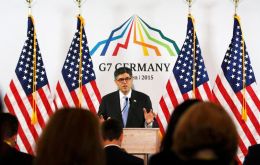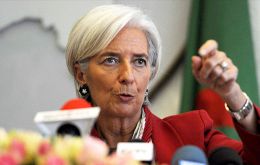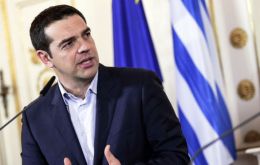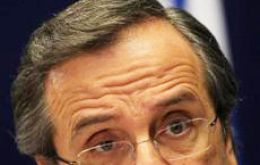MercoPress. South Atlantic News Agency
Tag: Greece
-
Saturday, May 30th 2015 - 08:51 UTC
US and Germany disagree about a world economy 'possible accident' if Greece collapses

The United States warned on Friday of a possible accident for the world economy if Greece and its creditors miss their June deadlines to avert a debt default. Germany said there was no sign of a breakthrough. The ongoing debate is taking place in Dresden, Germany in the framework of G7 Finance ministers and central bank chiefs meeting.
-
Friday, May 29th 2015 - 09:16 UTC
G7 finance chiefs meet in Dresden to discuss global recovery, but Greece overshadows

Finance chiefs and central bankers from the Group of Seven economic powers discussed ways to revive the faltering global recovery on Thursday as the United States leant on Europe to reach a deal to avert a Greek bankruptcy. The threat of a Greek default, rising oil prices and bond market volatility are fuelling investor nervousness about the world's economy.
-
Thursday, April 16th 2015 - 08:54 UTC
The 1.1 trillion Euro bond buying program is 'effective' says ECB' president Dragui

A protester crashed a press briefing as the European Central Bank (ECB) explained the success of its 1.1 trillion euro bond buying plan. ECB President Mario Draghi said: “There is clear evidence that the monetary policy measures we have put in place are effective.”
-
Thursday, March 12th 2015 - 00:12 UTC
Greece demands reparations from Germany for Nazi occupation crimes, loan and destruction

The Greek government has threatened to seize German property as compensation for a Nazi atrocity in World War Two. Justice Minister Nikos Paraskevopoulos said he was ready to approve a Supreme Court ruling from 2000 backing payment to relatives of the 218 victims.
-
Tuesday, January 27th 2015 - 06:44 UTC
Germany waiting for Tsipras government move: Greece must stick to its commitments

Greece’s election has sent shockwaves throughout Europe and especially Germany. The Euro zone’s biggest economy and paymaster has reluctantly footed a big bill for bailing out Greece and other euro members, extending financial aid in return for strict and unpopular austerity measures.
-
Monday, January 26th 2015 - 05:27 UTC
Greece's anti austerity party wins election: one short of an absolute majority

Anti-austerity Syriza party has won Greece's general election, putting the country on a possible collision course with the EU over its massive bailout. With nearly 75% of the votes counted, Syriza is projected to win 149 seats, just two short of an absolute majority, though that number could change.
-
Friday, January 9th 2015 - 06:42 UTC
Merkel said Germany wants Greece in the Euro-zone, but Athens must abide bailout terms

Germany's Angela Merkel has played down the chances of a Greek exit from the Euro zone, but made clear she expected Athens to stick to the terms of its international bailouts after this month's election.
-
Tuesday, January 6th 2015 - 07:24 UTC
Germany' growing consensus to let Greece drop out of the Euro block

Germany has said it will not be “blackmailed” into renegotiating Greece’s rescue program should a new hard left government take office after elections later this month. The Euro dropped to a nine-year low after a report in Der Spiegel magazine on Monday that Berlin was no longer opposed to Athens leaving the currency bloc.
-
Thursday, July 3rd 2014 - 06:14 UTC
“Greece is not Argentina”, PM Samaras tells the European Parliament

Greek Prime Minister Antonis Samaras said “Greece is not Argentina” and pledged his country will avoid Argentina’s fate of staying mired in economic troubles more than a decade after defaulting on debt.
-
Friday, April 11th 2014 - 22:06 UTC
Greece returns strongly to the bond market with a 3-billion Euro issue at 4.95%

Two years after it nearly crashed out of the Euro zone, Greece returned to the bond market this week with yield-hungry investors rushing to buy its debt in a 3-billion Euro deal that could mark the beginning of the end of its bailout. Athens offered a yield of just 4.95% to sell five-year bonds, the second lowest borrowing costs for a bailed-out Euro zone state returning to market.
